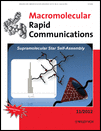
Gels
metrics 2024
Innovating the Future of Gel Science
Introduction
Gels is a distinguished, peer-reviewed journal published by MDPI, focusing on the innovative field of gels and their myriad applications across disciplines such as bioengineering, biomaterials, and organic chemistry. Since its inception in 2015, this Open Access journal has provided a platform for researchers to disseminate cutting-edge findings, enabling wider visibility and impact for their work. Based in Switzerland, Gels has firmly established itself within the academic community, achieving notable recognition as evidenced by its recent Q1 ranking in Polymers and Plastics, and multiple Q2 placements in related categories, demonstrating its relevance and importance in the field. The journal serves as a vital resource for professionals and scholars aiming to engage with the rapidly evolving research landscape surrounding gel technologies, making significant contributions to sustainable materials, drug delivery systems, and much more. With its commitment to Open Access, Gels ensures that research findings are readily accessible to all stakeholders, fostering collaboration and advancement in science and engineering fields.
Metrics 2024
 -
- 5.00
5.00 4.90
4.90 -
-Metrics History
Rank 2024
IF (Web Of Science)
JCI (Web Of Science)
Quartile History
Similar Journals

Regenerative Biomaterials
Elevating Standards in Regenerative BiomaterialsRegenerative Biomaterials, published by Oxford University Press, serves as a premier platform for the dissemination of innovative research in the rapidly evolving field of biomaterials. Since its inception in 2014, this esteemed open-access journal has fostered a collaborative and diverse scientific community, providing free access to impactful articles that enhance our understanding of regenerative medicine and tissue engineering. With a commendable impact factor and ranking within the top quartiles of both Biomedical Engineering and Materials Science, it is recognized for its rigorous peer-review process and high-quality publications. The journal aims to bridge the gap between fundamental research and applied sciences, promoting advanced studies that contribute to clinical applications and regeneration strategies. Researchers, practitioners, and students alike are encouraged to engage with the journal’s content to foster interdisciplinary collaboration and drive future innovations in the biomaterials domain.

ADVANCES IN COLLOID AND INTERFACE SCIENCE
Innovating Insights in Colloidal SystemsADVANCES IN COLLOID AND INTERFACE SCIENCE, published by Elsevier, stands as a premier journal in the disciplines of colloid and interface science, with an esteemed impact factor reflecting its influential research contributions. As a leader in its field, it holds an impressive Q1 ranking across multiple categories, including Colloid and Surface Chemistry, Physical and Theoretical Chemistry, as well as Surfaces and Interfaces. Established in 1967 and continuing its legacy through 2024, the journal provides a vital platform for dissemination of innovative findings and techniques in colloidal systems and interfacial phenomena. Researchers and professionals engaged in these areas will find a wealth of insights and advancements, given its high percentile rankings in Scopus that underscore its significance in both chemistry and physics. While the journal maintains a subscription-based model, it remains an essential resource for anyone looking to deepen their understanding of the complex interactions defining modern materials science.

Carbohydrate Polymers
Fostering collaboration in polymer research.Carbohydrate Polymers is a prestigious academic journal, published by ELSEVIER SCI LTD, that plays a vital role in the field of materials chemistry, organic chemistry, and polymer science. With its Q1 category rankings in these domains, this journal serves as a critical platform for disseminating high-quality research, innovative methodologies, and significant advancements in carbohydrate-based polymers. Since its inception in 1981 and continuing until 2025, it has fostered critical discussions and collaborations among researchers, professionals, and students worldwide. Although it does not offer open access, its rigorous peer-review process ensures that only the most impactful studies are published. By highlighting new developments in the synthesis, characterization, and application of carbohydrate polymers, Carbohydrate Polymers consistently contributes to the enhancement of knowledge and technology within its field, making it an essential resource for anyone working at the intersection of chemistry and materials science.

Progress in Biomaterials
Pioneering Research for a Sustainable TomorrowProgress in Biomaterials is a premier journal published by Springer Heidelberg, dedicated to advancing the field of biomaterials through the dissemination of high-quality research articles, reviews, and case studies. The journal, with an ISSN of 2194-0509 and an E-ISSN of 2194-0517, holds an esteemed position within both the Biomaterials and Chemical Engineering fields, as evidenced by its rankings in the Q2 and Q1 quartiles, respectively. With its convergence over the years from 2013 to 2023, it has maintained a strong impact on scientific discourse, ranking #15 in Chemical Engineering and #30 in Biomaterials according to Scopus metrics. The journal is based in Heidelberg, Germany, and aims to provide an open platform for interdisciplinary collaboration amongst researchers, professionals, and students alike, fostering innovation and progress in biomaterials research. As a crucial resource for those engaged in this dynamic field, it empowers authors and readers to explore the latest trends, technologies, and applications in biomaterials development.

MACROMOLECULAR RAPID COMMUNICATIONS
Unleashing Innovation in Polymers and PlasticsMACROMOLECULAR RAPID COMMUNICATIONS, published by WILEY-V C H VERLAG GMBH in Germany, is an esteemed journal dedicated to the rapid dissemination of high-quality research in the fields of materials chemistry, organic chemistry, and polymers and plastics. With a remarkable 2023 impact factor securing its place in the prestigious Q1 category across three key disciplines, the journal ranks impressively within the top quartiles of the Scopus metrics, standing at 36th in organic chemistry and 35th in polymers and plastics. Although the journal does not offer open access options, its informative depth and innovative research make it an invaluable resource for researchers, professionals, and students seeking to stay abreast of the latest developments in macromolecular science. Covering a broad spectrum of topics from fundamental research to applications, MACROMOLECULAR RAPID COMMUNICATIONS aims to foster collaboration and inspire further advancements within the scientific community.

Materials Science & Engineering C-Materials for Biological Applications
Pioneering new frontiers in biomaterials research.Materials Science & Engineering C-Materials for Biological Applications is a premier journal published by ELSEVIER, dedicated to advancing the field of biomaterials through interdisciplinary research. With a robust ISSN of 0928-4931, this journal has made its mark in the realms of Chemical Engineering and Materials Science, achieving impressive Scopus rankings within its categories, namely Rank #16/151 in Bioengineering (89th percentile) and Rank #13/112 in Biomaterials (88th percentile). Although the journal's coverage in Scopus has been discontinued since 2021, it remains a critical resource for researchers, professionals, and students eager to explore innovative materials and their applications in biological contexts. The journal’s open access policy enhances its accessibility, fostering a global exchange of knowledge and inspiring future advancements in the field of materials science.

JOURNAL OF BIOMEDICAL MATERIALS RESEARCH PART A
Innovating the intersection of materials science and medicine.JOURNAL OF BIOMEDICAL MATERIALS RESEARCH PART A, published by WILEY, is a leading journal in the field of biomaterials and biomedical engineering, showcasing cutting-edge research that bridges the gap between material science and healthcare applications. With a robust 2023 impact factor reflecting its high-quality contributions, this journal is classified in the Q2 quartile for Biomaterials, Biomedical Engineering, and Ceramics and Composites, while achieving an impressive Q1 ranking in Metals and Alloys. The journal caters to a diverse readership, including researchers, professionals, and students, aiming to facilitate innovation and advancements in biocompatible materials and their applications in medical devices and tissue engineering. Access options for readers are available, ensuring the latest studies and findings are readily accessible to all stakeholders in this dynamic field. As it progresses towards its 2024 target, the JOURNAL OF BIOMEDICAL MATERIALS RESEARCH PART A continues to be an essential resource for anyone involved in the development and application of biomedical materials.

Materials Today
Exploring Innovations in Materials and EngineeringMaterials Today is a premier academic journal published by Elsevier Science Ltd, specializing in the dynamic fields of materials science, mechanical engineering, and condensed matter physics. Established in 1999, the journal has garnered an enviable reputation, consistently ranking in the Q1 category across multiple disciplines including mechanics of materials and general materials science, reflecting its influence and high-quality research output. With an impressive Scopus ranking—4th in both mechanical engineering and mechanics of materials, and 6th in condensed matter physics—Materials Today serves as an essential resource for researchers, professionals, and students seeking to stay at the forefront of developments in material innovations and applications. The journal is known for its commitment to publishing significant research findings and reviews, making it a vital platform for disseminating knowledge and fostering collaboration in the rapidly evolving materials field. Although it does not offer open access, its robust impact factor underscores the importance of the content published, ensuring wide visibility and citation among the academic community. Explore the rich tapestry of materials research with Materials Today, where groundbreaking insights pave the way for future technological advancements.

Bioactive Materials
Exploring the Intersection of Science and BioengineeringBioactive Materials, published by KEAI PUBLISHING LTD, stands as a leading Open Access journal in the fields of Biomaterials, Biomedical Engineering, and Biotechnology. Since its inception in 2016, this journal has rapidly ascended in prominence, currently holding a prestigious Q1 category ranking across multiple disciplines, reflecting its significant impact within the scientific community. With its E-ISSN 2452-199X, it spans a broad spectrum of research areas, contributing valuable insights to the ongoing discourse in bioactive materials and their applications. The journal's superior Scopus rankings further illustrate its influence, boasting impressive standings in engaging niches such as engineering and molecular biology. Bioactive Materials offers a vital platform for researchers, professionals, and students to disseminate and acquire cutting-edge knowledge, thus fostering innovation and collaboration in the rapidly evolving terrain of biomedicine. Its commitment to Open Access since 2016 enhances accessibility, ensuring that the burgeoning advancements in this field reach a global audience.

BIOPOLYMERS
Pioneering Insights in Biochemistry and BeyondBIOPOLYMERS, a distinguished journal founded in 1963 and published by WILEY, serves as an essential platform for the dissemination of research in the fields of biochemistry, biomaterials, biophysics, and organic chemistry. With an ISSN of 0006-3525 and E-ISSN 1097-0282, this journal has been pivotal in advancing our understanding of the intricate roles that biopolymers play in various biological systems and their applications in medicine and technology. The journal is recognized for its rigorous peer-review process and has established itself within the academic community, boasting impressive Scopus rankings across multiple disciplines, including a Q2 ranking in both Biophysics and Medicine for 2023. Although it does not offer Open Access options, BIOPOLYMERS provides invaluable access to critical insights and developments in the study of biopolymers, appealing to researchers, professionals, and students dedicated to innovating in this dynamic field.